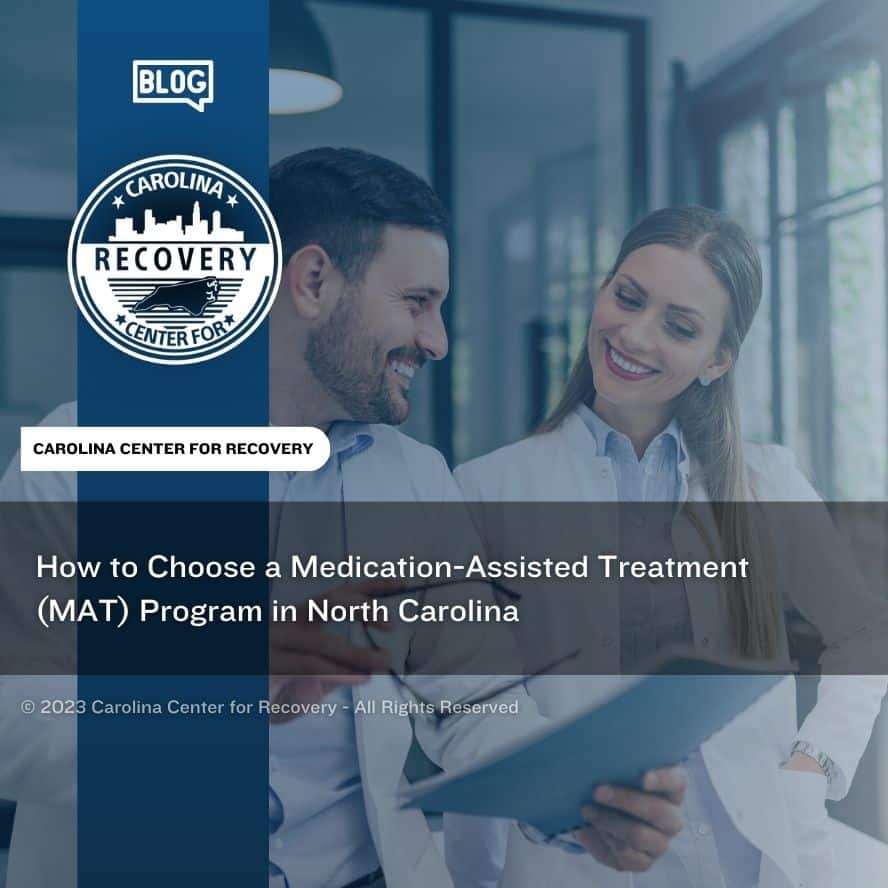How to Choose a Medication-Assisted Treatment (MAT) Program in North Carolina

Medically Verified: 2/1/24
Medical Reviewer
Chief Editor

All of the information on this page has been reviewed and verified by a certified addiction professional.
According to the U.S. Department of Health and Human Services (HHS), 46.3 million people met the criteria for a substance use disorder in 2021.[1]
Addiction can be challenging to overcome, especially when you are dealing with withdrawal symptoms or cravings. Oftentimes, these things can make it difficult to focus during addiction treatment, preventing you from fully absorbing all of the information you need to maintain long-term recovery.
Thankfully, there is a type of addiction treatment that uses medications to prevent severe withdrawal symptoms and soothe cravings called medication-assisted treatment (MAT). These programs combine life-saving medications with traditional addiction treatment methods like evidence-based behavioral therapy and counseling.
If you are considering attending a MAT program in North Carolina, you want to choose a reputable one. When picking a MAT program, you should look for one that offers accreditation and licensing, qualified staff members, safe prescribing methods, and more.
What Qualities Should You Look For When Choosing a Medication-Assisted Treatment (MAT) Program in North Carolina?
Medication-assisted treatment programs are highly beneficial, offering numerous benefits including a reduced chance of relapse and heightened retention during rehab. However, not every MAT program is created equally, so it’s helpful to be familiar with the qualities that make a reputable MAT program when choosing one in North Carolina.
Accreditation and Licensing
Addiction treatment programs can go through a process called accreditation that ensures their programs are safe, effective, and operating under the national standards of treatment. When looking for an accredited MAT program, you can check their website. Look for an accreditation from the Commission on Accreditation of Rehabilitation Facilities (CARF).
Additionally, MAT centers in North Carolina can receive state licenses that indicate their program is regularly assessed and inspected to ensure quality treatment services. It is always best to choose a medication-assisted treatment center that is accredited, licensed, or both.
Qualified Staff Members
Another way to ensure that your MAT program is reputable is by checking the qualifications of the staff members they hire. For example, all medical professionals should have degrees in their field. This means nurses should be CNAs, LPNs, or RNs, while psychologists should have some type of mental health or social work degree.
Safe Prescribing and Medication Management
Another important factor to consider is whether the program is using safe prescribing methods. They should be assessing you to determine what type of medication is best suited for your needs. Additionally, reputable MAT programs in North Carolina will carefully regulate and administer your medications according to safe prescribing guidelines. Proper medication management helps reduce medication abuse and increases treatment adherence.
Evidence-Based Behavioral Therapies
When choosing a medication-assisted treatment program in North Carolina, you should always go with one that uses evidence-based behavioral therapies. While the medications used during MAT can be highly beneficial for your recovery, they are not a cure. Quality programs will also use evidence-based behavioral therapies to ensure you develop the tools and skills necessary to maintain long-term recovery.
Examples of evidence-based behavioral therapies for addiction include:[2]
- Cognitive behavioral therapy (CBT)
- Motivational interviewing (MI)
- Contingency management (CM)
- 12-step facilitation therapy
- The matrix model
- Family behavior therapy
Therapy should be provided one-on-one and in group settings. Behavioral therapies help you learn how to manage your emotions without substances, identify and manage triggers, and overcome any psychological issues you may be facing.
Aftercare Services
Recovery does not end once you graduate from a treatment program, which is why MAT rehab centers in North Carolina should always offer aftercare services.
Aftercare services include the tools and support you will need to maintain long-term sobriety from drugs and alcohol. For example, many MAT centers offer alumni programs that keep you connected with a recovery community that will support you, offer advice, and teach you how to have fun in sobriety without using substances.
Examples of aftercare services used by top-rated MAT programs in North Carolina include:
- Continued therapy
- Medication management services
- Access to an alumni support group
- Recommendations on local support groups to attend like 12-step meetings
- Referrals to outpatient programs or sober living housing
- Case management services like assistance in finding vocational, legal, and medical services
Find out if Medication-Assisted Treatment (MAT) in North Carolina is Right for You
If you or a loved one struggles with a substance use disorder, medication-assisted treatment might be right for you. MAT programs in North Carolina offer a comprehensive, whole-person approach to recovery, alleviating withdrawal symptoms and keeping cravings at bay so you can focus on your recovery.
Located in Charlotte, North Carolina, our CARF Gold Seal-accredited drug and alcohol rehab center proudly offers medication-assisted treatment to individuals battling opioid and alcohol addiction. We know just how difficult early recovery can be, but we also have the tools, resources, and expertise to help you get through it.
To learn more about our programs or to get started with a confidential, risk-free assessment, please contact us today.
References:
- The U.S. Department of Health and Human Services (HHS): SAMHSA Announces National Survey on Drug Use and Health (NSDUH) Results Detailing Mental Illness and Substance Use Levels in 2021, Retrieved December 2023 From https://www.hhs.gov/about/news/2023/01/04/samhsa-announces-national-survey-drug-use-health-results-detailing-mental-illness-substance-use-levels-2021.html
- The National Library of Medicine (NLM): Evidence-based practices for substance use disorders, Retrieved December 2023 From https://www.ncbi.nlm.nih.gov/pmc/articles/PMC3678283/

